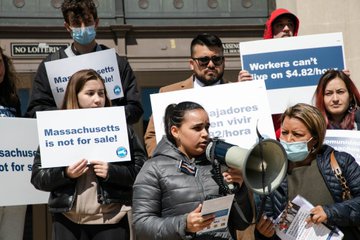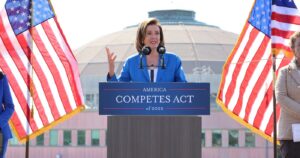In November, California passed Proposition 22, a ballot referendum which exempts gig companies from California labor law and keeps their workers classified as independent contractors instead of employees. As a result of the law, app-based drivers are denied minimum wage and overtime protections, paid sick time and family leave, unemployment insurance and workers’ compensation, and protections against sexual harassment and racial discrimination at work. Gig companies spent a record $210 million on misleading ads to pass the ballot initiative, falsely claiming the workers needed to cede their civil rights and worker benefits in exchange for “flexibility.”
Following Proposition 22’s passage, the companies expressed that they plan to bring similar laws to other states. Anthony Foxx, Lyft’s chief policy officer stated, “we think that Prop 22 has now created a model that can be replicated and can be scaled.” After failing to pass a law in New York that would classify gig workers as independent contractors, the companies are turning their attention to Massachusetts.
But they won’t be able to repeat the Proposition 22 playbook without a fight. On June 22, a coalition of workers, advocates, unions, and civil rights groups came together as the Coalition to Protect Workers’ Rights to push back. “Our message to these out-of-state tech giants is very simple: if you want to do business in Massachusetts, you must follow the law! Just like every other employer in Massachusetts: follow the law,” Massachusetts AFL-CIO President Steve Tolman said.
The Coalition is armed with evidence of the companies’ false promises that Proposition 22-like legislation is a better deal for gig workers. As soon as the law passed, California’s major grocery chains replaced full-time, benefits-receiving drivers with gig workers. Uber revoked California drivers’ ability to set their own prices, betraying the claim that Proposition 22 would allow workers to maintain autonomy. Many workers have seen their pay decrease since Proposition 22’s passage, with some GrubHub drivers’ earnings plummeting by 50 percent. And Uber drivers need to work almost 50 hours per week to receive the basic health benefits supposedly guaranteed by Proposition 22.
“I have been in hand-to-hand combat in the courtroom with these companies for years. And I have seen their tactics. I have seen what they do to manipulate the truth, misrepresent the facts like they did in California,” said Massachusetts labor lawyer Shannon Liss-Riordan. “And we cannot let them do that. Because today it’s the app-based drivers. Tomorrow it’s everyone’s job. Tomorrow it’s your job.”
The campaign launched as Massachusetts Attorney General Maura Healey is suing Uber and Lyft for illegally misclassifying their drivers as independent contractors rather than employees. Employees in Massachusetts are guaranteed paid sick time, family and medical leave, and a minimum wage above the federal mandated level. The new ballot measure would codify this misclassification by excluding hundreds of thousands of gig workers, the majority of whom are immigrants and people of color, from the definition of “employee” under Massachusetts law.
As Tarshia Green-Williams from Coalition member Action for Equity put it, “we need to stop letting corporate greed determine who is worthy and who is not. Who can sustain a family and who cannot. Who can survive and who cannot.”



